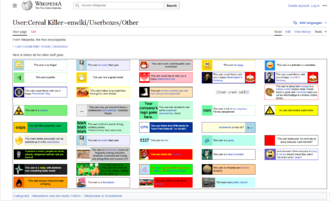Userboxitis
Userboxitis is an unfortunate, debilitating condition displayed by members of online Wikis such as Wackipedia and Taterpedia, in which the sufferer becomes mentally dependent on Userboxes. Commonly observed amongst Wikiholics, the individual concerned often becomes disillusioned, treating their userpage as a My Space style blog.
Symptoms[edit]
Userboxitis is most common in the Geek and Leet population but can affect any individual who has ever visited a Wiki and come across a userbox.
Early signs of the disease include the attraction to colourful, oblong squares or cuboids. This stretches further than simply within cyberspace: the sufferer will often stare at cardboard boxes, and in some extreme cases television sets. More intermediate signs of possible contraction are the inclusion of utterly pointless templates already created by other sufferers and the bookmarking of Wikipedia's Userbox Page in their computer's browser. Furthermore, the individual will find themselves visiting the page on an hourly basis in order to check for updates which they add to their userpage.
The final, most disturbing and sure sign of contraction of Userboxitis is the mass creation of new userboxes. These are invariably in(s)ane and meaningless, relaying obtuse messages which only the person who created them will understand. In addition to this, the individual will spend 98% of their time on the Internet creating them and placing them on their userpage.
Psychological and Physical Addiction[edit]
One of the primary components of userbox addiction is the person's belief that userboxes provide value to them. This value can come from any of a large selection of sources, including:
- belief that it improves their ability to socialize;
- belief that it helps them handle pressure from abusive vandals;
- desire for a state of calm and well-being brought on by userbox creation;
- peer pressure, or fear alienation if the person doesn't like userboxes;
- desire to conform to a social norm: ie. perceived 'Wikipedian' rituals;
- sense of superiority from ability to handle extreme userboxification;
- sense of superiority from knowledgeably of userboxes.
These effects all contribute to a person's impression of the beneficial effects of userboxes in his life, and may result in a denial of the negative effects. It is important to recognize that many of these benefits are real, not imagined. For instance, some people really are more enjoyable to be around when they're creating userboxes, and userboxes really do help some people handle stress better. Userboxitis becomes a problem when the negative effects exceed the positive ones, although for a typical 'userboxaholic' this point is reached very quickly.
Social Effects[edit]
The social problems arising from userbox abuse can include loss of employment, financial problems, marital conflict and divorce {though this is very rare, as typical sufferers are without partners), convictions for crimes such as Wikiabuse, (vandalisation) loss of orientation, and loss of respect from others who may see the problem as self-inflicted and easily avoided. Userbox dependence affects not only the addicted but can profoundly impact the family members around them.
Beliefs about Userboxitis[edit]
Many Userboxitis sufferers share similar views on the illness, and most would agree with the following statements:
- Userboxitis has no cure. Once an userboxaholic, always an userboxaholic. There is no way to make a "normal" Wiki user out of a userboxaholic. Userboxaholics who do not visit wikis can recover and function in normal society, but should they see userboxes again, their active userboxitis will re-emerge quickly and be as debilitating as before. This is true even in cases where userboxaholics have avoided userboxes for many years before relapsing.
- Userboxitis is a progressive illness. Over time, userboxaholics who continue to create userboxes will get worse. Those who keep creating will often die from Wikiabuse-related causes or be institutionalized (prison, hospital or asylum).
- The first sight of a userbox does the damage. Once an userboxaholic sees a userbox, a powerful craving for more userboxes sets in. This makes moderation or controlled use of wikis nearly impossible.
- The desire to stop creating needs to come from the userboxaholic. This often happens as a result of the userboxaholic realizing that his or her life has become unmanageable and that excessive userbox creation is the cause. This is termed as "hitting bottom" - a potentially life-changing moment when the userboxaholic perceives an urgent need for major personal change.
- A userboxaholic cannot recover on his or her own. An userboxaholic needs (or will benefit from) the fellowship of other userboxaholics. Contact with other userboxaholics provides an essential ingredient to the process of recovery.
Treatment[edit]
Away from Wikiland, the user will also often create their own web page which is often just as stupid and contain more random crap. This helps Wikidoctors to distinguish the sufferer's level of reliance on vanity, and aids them in deciding the type of treatment required. The most common methods of treatment are:
- Medication. The classical use of medications for Userboxitis is to encourage abstinence. Antabox (also known as Vitamin C), for instance, prevents the elimination of chemicals which cause severe discomfort when userboxes are sighted, effectively preventing the userboxaholic from spending extended amounts of time on Wikipedia while they take the medicine. Use of Paracetamoxyfrusebendroneomycin can ease the effects of withdrawal, but only on a short term basis.
- Over-Exposure. During earlier stages of the disease, the sufferer can be shown various examples of over-exaggerated effects of the condition. The theory is that exposing the individual to extreme cases will deter them. The most successful way so far has been to fill one window with userboxes to the point where the scroll bar is not visible to the naked eye.
- Therapy. This generally involves the help of a Wikicounsellor, who organizes regular meetings of Userboxes anonymous. Here, sufferers can converse and relate to each others' problems and personal coping methods. In addition, members are encouraged to take part in therapeutic recreation.
Known Sufferers[edit]
See Also[edit]
| Parts of this article were originally sporked from Wackipedia. |



